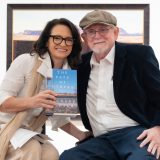Working Through Despair and Blockage
September 24, 2018
 By Mariam Said
By Mariam Said
MFA Program Assistant
When I first started applying to MFA programs a little more than a year and a half ago, it was for the purpose of finding a writing community. I was in the middle of my second year of teaching, and I was miserable, I wasn’t writing, and I wanted out. Surrounding myself with other writers seemed like the perfect solution to get my writing juices flowing again, if not by inspiration, then at least by a little shame. So far, this hasn’t been unfolding as planned. As someone who is inept at establishing routines, keeping up with a writing habit in moments of despair and blockage has proven tough and at times impossible.
While I write more now than I did when I was teaching, it is only when I feel I am under great pressure to turn in assignments on time (or at least not too late). I would like to blame my lack of work ethic on anxiety and depression, but that feels like a copout. Many of my friends with the same diagnoses still find ways to find time for the comfort that writing or having written provides them.
In response to my question about how to work past moments of despair and blockage, second-year MFA student Liz Harmer shared sage words that could go into a best-selling coffee table book: “There is not really getting past it but more managing it and trying to use it for. . . work. I don’t think you need to suffer to make art but you CAN turn your suffering into art.” Liz says that self-care is of the utmost importance. For her this means “not drinking, exercising, sleeping enough, [and/or] watching something funny.”
There can be as many different methods of self-care as there are individuals in the world. Find what works best for you. While I hate it, I have found that exercising makes me feel better about myself and helps me focus in on what needs to be done later on. I am also quite partial to anything that gives me an excuse to whittle away at my Netflix list. Slap a sheet mask on my face, and I’ll be even happier to sit back, zone out, and self-care for the grand purpose of finding inspiration.
Concise king and second-year MA/MFA Dual Degree student Matt Goldman says, “I write any garbage that pops into my head to get past blocks. Eventually something sticks and starts to inspire me.”
Meg Boyles, a second-year MFA student focusing on poetry, has a similar tactic. When she feels stuck, she thinks back to “old poetry prompts, [and] that starts to give [her] a way back into the writing.” Sometimes working around restraints is conducive to firing up her writing juices. She’ll focus on writing “a sentence with an internal rhyme and an image” or she’ll “mimic the sentence structure” of whatever she can find closest to her to help her write in a way that she normally wouldn’t.
One of Meg’s strategies that I have found helpful for my own writing is going back to a piece of writing that has particularly vivid imagery to remind myself of what Meg describes as a “feeling I want to evoke.” And Meg admits, “If all else fails. . . save the document and start a new one.”
I haven’t eliminated my despair and blockage, but I’m not in this alone—and neither are you. If you have a strategy to overcome writer’s block, share it in the comments.

